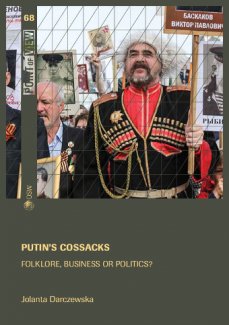Putin’s Cossacks

Russia’s Cossacks evoke extreme opinions among observers: some see them as a marginal social phenomenon, a kind of political folklore; others as a morally and physically healthy part of the nation, a pillar of the modern paramilitary formations which defend the national and cultural borders of the Russian Federation. This text is an attempt to interpret this issue in terms of a socio-political process, which has resulted in the transformation of a spontaneous, bottom-up movement into one monitored and directed from the top down. Regardless of this fundamental change, the Cossacks (or more specifically, the ‘neo-Cossacks’) still define themselves as a cultural and historical community, with the aid of such characteristics as a defensive, pro-state mentality, a militarised lifestyle and service to the state, the Orthodox religion, and their distinct traditions and customs. The first part of this analysis examines the official narrative of neo-Cossackdom through the prism of key concepts. These (the Cossack state, the Cossack register, registered Cossacks, the Cossack state service) carry a large dose of misinformation, because they have been torn out of their historical context and placed in today’s Russian realities. The second part is devoted to Russia’s strategic policy objectives regarding the neo-Cossacks, and the organisational system set up to implement this policy. The text closes with a list of the functions assigned to the Cossacks, i.e. the long-term interests of the Kremlin linked to them.




